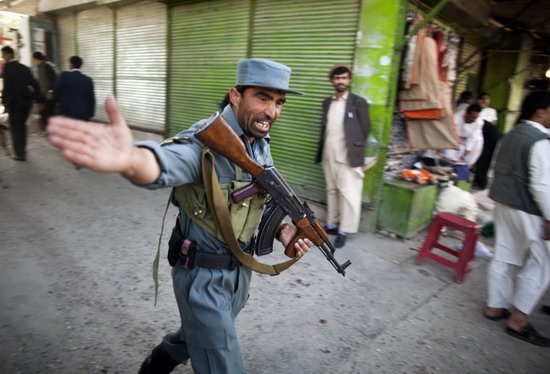Asia-Pacific
Afghan leader confirms peace talks; Kabul attacked
(Agencies)
Updated: 2011-06-19 07:15
 |
Large Medium Small |
|
 An Afghan policeman shouts at the public to move away from the site of an attack at a Kabul police station June 18, 2011. [Photo/Agencies] |
President Barack Obama is weighing a range of options for starting the withdrawal of some American forces.
The US has roughly 100,000 troops in Afghanistan. When the president sent an additional 30,000 US forces to Afghanistan at the end of 2009, he did so with the caveat that some of those troops would start coming home in July.
US State Department spokesman Mark Toner said only that the US has "consistently supported an Afghan-led" peace process.
"Over the past two years, we have laid out our red lines for the Taliban: They must renounce violence; they must abandon their alliance with al-Qaida; and they must abide by the constitution of Afghanistan," Toner said. "This is the price for reaching a political resolution and bringing an end to the military actions that are targeting their leadership and decimating their ranks."
Karzai said some Taliban emissaries who have met with members of the peace council he set up last year were only representing themselves, while others were speaking for the broader movement. The exact nature of the contacts was not immediately clear, and Karzai said no government official outside of the council had contact with them.
Karzai's rambling speech was the latest tweak to the US-led coalition trying to control a message about a war grinding toward the decade mark. It likely overstates the progress of the delicate negotiations both his government and others face in identifying and wooing potential Taliban leaders.
Many of the movement's leaders remain either unknown or underground since fleeing Kabul at the start of the US-led invasion. Mullah Mohammad Omar, the Taliban's one-eyed leader, has not been seen publicly since 2001.
Officials also have been duped before. Late last year, a Quetta, Pakistan, shopkeeper posed as the Taliban's former aviation minister, Mullah Mohammed Akhtar Mansour, and met twice with Western officials before they realized they had been tricked.
However, such talks may be gaining momentum after the U.N. Security Council voted unanimously Friday to treat al-Qaida and the Taliban separately when it comes to U.N. sanctions, a move aimed at supporting the Afghan government's reconciliation efforts.
Meanwhile, violence persists. Insurgents attacks targeted three convoys ferrying fuel and supplies to NATO troops in western and eastern Afghanistan over the weekend, killing nine Afghan security guards and torching at least 15 fuel tankers, officials said.
In the eastern city of Jalalabad, insurgents kidnapped a provincial council member for Logar province and three of his family members.
Three NATO service members also were killed Saturday _ two in southern Afghanistan and one in the east, according to the alliance. At least 33 international soldiers have died in Afghanistan so far this month, raising the death toll for 2011 to 239.
| 分享按钮 |